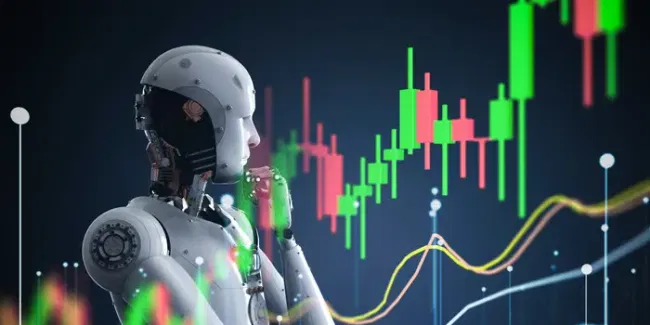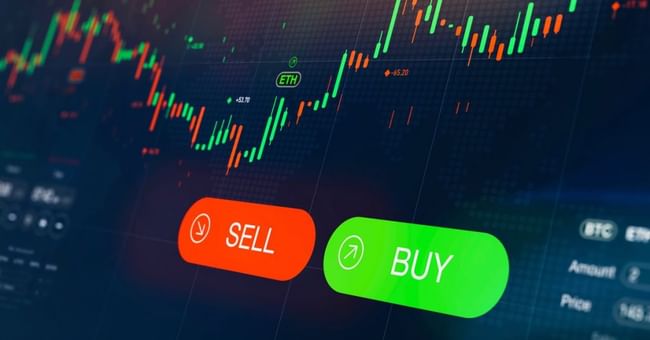In recent months, you've certainly seen the rise of AI around the world.
Everyone is now grappling with whether or not this technology will replace them at work or take over the world. That's one, the more widespread view, but only a minority are really looking at how this future technology could help them.

With the advent of OpenAI and their chat bot ChatGPT, artificial intelligence has spread into the mainstream. But AI has been here long before that. We all encounter it in everyday life. For example, banking and online transactions use AI - that is, if you've ever paid with a card...
Artificial intelligence is great for a large group of tasks that it can perform for you. But it's always a question of whether it can do it better than you can.
The same is true for investing. Can AI do the investing for you, or do you need further development?
What is AI and how does it work in investing
AI is a computer system designed to simulate human intelligence. It learns and improves its analysis based on the data it receives.
In investing, AI is used to analyse market trends, company performance and other economic indicators to identify the best investment opportunities. By constantly learning and improving, AI algorithms can provide investors with valuable insights that humans may overlook. This allows investors to make much better decisions in less time. Since AI never sleeps, it can work constantly.

The investor then simply scrolls through the results and chooses what is appropriate for the moment. These systems can act as financial advisors using artificial intelligence.
Benefits of using AI in investing
One of the main advantages of using AI is that it can analyze huge amounts of data in seconds, which can take people hours or even days.
Through machine learning, AI can help identify trends and patterns that humans would never be able to detect. By analyzing historical trends and patterns, AI can provide predictions of future stock price movements based on both technical and fundamental analysis.
Artificial intelligence can also help reduce the likelihood of human error and create a more accurate and reliable investment plan for traders and long-term investors.
Why beware
One of the biggest drawbacks of using AI in investing is the cost. AI software and services can be expensive, especially for individual investors or small businesses.
In addition, there is always the risk of algorithm failure or computer error, which can lead to significant losses. Artificial intelligence algorithms and predictive analytics cannot account for everything, such as unexpected events, natural disasters or political upheaval that could affect markets. With such market volatility and unpredictable external forces affecting the stock market, it can be difficult to accurately predict the next course of action.

It is always best to be self-reliant and use these technologies only as a supplement to what you are currently doing. Whether driving a car or investing, the last final human decision is the most important. There are well-functioning algorithms for trading, but they stick to fixed lines within which they can move. Once the price deviates, the trade doesn't get done.
Therefore, it is very difficult for a computer to trade , for example, fake breakouts on stocks, as the pattern is broken and then the move occurs. Professional traders are still better in this respect, but it is only a matter of time before AI catches up with them at least.
For the time being, AI is not yet perfect enough to fully replace a live human, or even a professional in the field. Retail investors should not rely too much on this technology and should always make their own decisions. Of course, it is not a bad idea to have AI evaluate information about a given company or the current market development. You can use it as another perspective and that always comes in handy right?
Used correctly, it can save you a lot of time and energy that you can invest elsewhere. Nowadays, it's still just a great tool, but despite that, you need to remember that it's still just code and a machine. It doesn't have intuition and human feeling. That can be an advantage, but it works as a double-edged weapon.
Now is not the time to leave our investment decisions entirely to artificial intelligence.
I'd love to read your views and any experiences in the comments.
This is not financial advice. I am providing publicly available data and sharing my views on how I would handle the situations myself. Investing is risky and everyone is responsible for their decisions.
Perfect writing, thanks for that, just an addition for me: "AI algorithms and predictive analysis cannot account for everything, such as unexpected events, natural disasters or political upheavals that could affect markets." Here I think that unfortunately even humans cannot do this, so I would say that the risk here is on both the human and AI side.
It's not perfect, but it will be soon. There are crazy advances and we're just seeing something in the early stages of development. The biggest threat will be regulation.
Well yeah so I got a recommendation from my AI the first time I asked what stock to invest in today so she refused and only answered when I asked what are the best stocks in AI today
NVIDIA (NVDA) is one of the best stocks in AI for 2023. Powerful processors are helping the development of AI. Other stocks are CrowdStrike (CRWD), which provides protection from hacker attacks and malware, and The Trade Desk (TTD), which offers effective online advertising through AI.
NVIDIA won't be a surprise, but I'll take a look at TTD 🙂 .